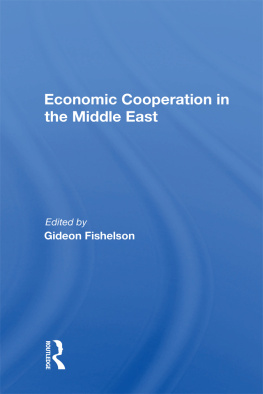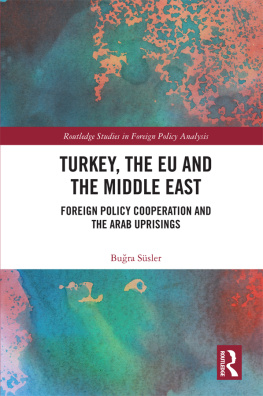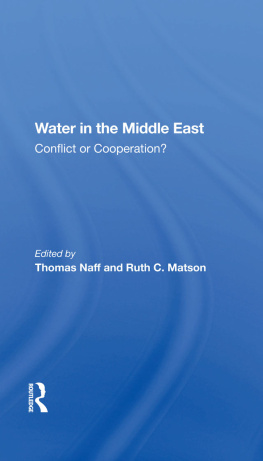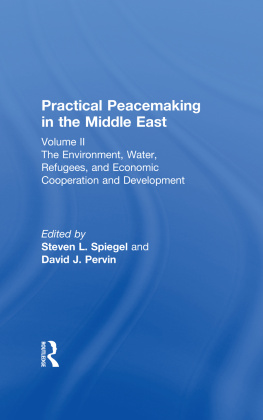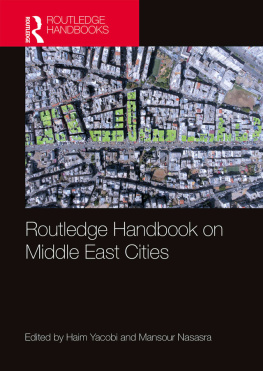Economic Cooperation in the Middle East
Economic Cooperation in the Middle East
Edited by
Gideon Fishelson
First published 1989 by Westview Press, Inc.
Published 2018 by Routledge
52 Vanderbilt Avenue, New York, NY 10017
2 Park Square, Milton Park, Abingdon, Oxon OX14 4RN
Routledge is an imprint of the Taylor & Francis Group, an informa business
Copyright 1989 Taylor & Francis
All rights reserved. No part of this book may be reprinted or reproduced or utilised in any form or by any electronic, mechanical, or other means, now known or hereafter invented, including photocopying and recording, or in any information storage or retrieval system, without permission in writing from the publishers.
Notice:
Product or corporate names may be trademarks or registered trademarks, and are used only for identification and explanation without intent to infringe.
Library of Congress Cataloging-in-Publication Data
Economic cooperation in the Middle East.
1. Middle EastEconomic conditions. 2. Middle
EastEconomic integration. 3. JewishArab relations
Economic aspects. 4. Economic development projects
Middle East. I. Fishelson, Gideon.
HC15.15.E28 1989 337.1'5 88-26138
ISBN 13: 978-0-367-01453-7 (hbk)
Contents
, Haim Ben-Shahar
, Gideon Fishelson
, Haim Ben-Shahar
, Eliezer Sheffer
, Eliyahu Kanovsky
, Ephraim Kleiman
, Elias H. Tuma
, Michael D. Intriligator and Dagobert L. Brito
, Jeffrey J. Schott
, Martin C. McGuire
, Joyce R. Starr
, Amon Gafny
, Mario I. Blejer
, Antonio Alonso-Concheiro
, Sam Nilsson
, Brian Hindley
, Seev Hirsch
, Yoram Meital
, Elisha Rally
, Baruch Raz
, RiadAjami
, Gideon Fishelson
This book contains the proceedings of the Armand Hammer Conference on Economic Cooperation in the Middle East that was held at Tel Aviv University on June 1-3, 1986, The conference was held under the auspices of the Armand Hammer Fund for Economic Cooperation in the Middle East Under Peace.
The objective of the Hammer Fund is to foster economic cooperation between Israel and her neighbors. Multinational economic relations can offer effective leverage in the political negotiations towards peace and once it is attained they can reinforce the countries concerned to become partners in prosperity. To this end the Fund seeks to identify areas of mutual economic interest and recommend specific joint economic projects.
The success of the conference was due first and foremost to the contribution made by all participants, and to the valuable cooperation and advice of the members of the academic committee: Professors Seev Hirsch, Baruch Raz, Gideon Fishelson, and the academic coordinator Dr. Leonardo Leiderman; the advisors, Professors Itamar Rabinowitz and Assaf Razin; and to the administrative staff, Yoram Shamir, Gerda Kessler, Esther Landau, Lionel Pyetan and particularly to Ruth Kimmel.
Professor Haim Ben-Shahar
Head, Steering Committee
The editorial board of the Proceedings of the Armand Hammer Conference on Economic Cooperation in the Middle East is proud to present this collection of studies presented at the conference.
This conference was the first in which politicians, academicians, policymakers and business entrepreneurs discussed the opportunities as well as the risks, benefits, and economic costs that peace offers and involves.
Although the framework for the conference was the Middle East, contributors also consider experience from other tense parts of the world, which face similar problems. Such experience can provide examples and guidelines for possible benefits that peace in the Middle East might open up.
The conference took place at Tel Aviv University, which provided an academic atmosphere and helped attract top quality lectures and interested participants.
In light of the diverse economic aspects of the peace process, the conference was divided into 7 sessions, each dealing with a fairly homogeneous topic. This volume contains revised versions of the papers presented at the conference sessions and reflects discussions of each study and its ramifications as well as additional ideas that came forth.
The editorial board would like to thank all those that contributed to the success of the conference. Their effort was rewarded and will be further recognized and appreciated in the future.
The volume opens with an overview of the research effort encouraged and financed by the Armand Hammer Fund for Economic Cooperation in the Middle East. The overview is written by Professor Ben Shahar, who initiated the research at Tel Aviv University.
The following collection of studies is divided into four sections: The first section deals with the pre-peace era, which is typified by the military buildup and its corresponding heavy economic costs (Sheffer, Kanovsky) and by occupier-occupied relations (Kleiman, Tuma).
The second section focuses on solutions to conflicts (Intriligator and Brito), methods to achieve their resolution such as sanctions (Schott), and risks of cooperation (McGuire).
The third section examines economic integration in the Middle East, its implications and possible costs. It also explores means of financing economic integration projects and the experience of other regions (Starr, Gafny, Blejer, Concheiro, Nilsson, Hindley).
The fourth section analyzes the consequences of peace and economic cooperation in the Middle East (Hirsch, Meital, Kally, Raz, Ajami, Fishelson).
This division is meant to help guide the reader through the studies without implying anything about the relative significance of any specific section. The collection is a unified self-contained package, in which each study supports and is supported by the others. The editors feel it is the most comprehensive representation of current economic thinking on the issue of peacemaking that is now available.
The main idea that continually surfaced and that sums up the findings of the conference is that political and economic relations and agreements are strongly interrelated and must move forward simultaneously. One strengthens and reinforces the other and it is unlikely that either can stand alone.
Professor Gideon Fishelson
Scientific Coordinator of the "Economic
Cooperation in the Middle East
Under Peace" Research Project
Riad Ajami, Director, Interdisciplinary Center for Technological Analysis and Forecasting at Tel Aviv University
Antonio Alonso-Concheiro, Foundacion Javier Barros Sierra, Mexico
Mario I. Blejer, International Monetary Fund, Washington, D.C.
Dagobert L. Brito, Department of Economics, Rice University
Gideon Fishelson, Professor, Department of Economics, Tel Aviv University, and Head, Economics Section, Interdisciplinary Center for Technological Analysis and Forecasting
Arnon Gafny, Chairman of the Board, Koor Industries, and former director, Bank of Israel
Brian Hindley, The World Bank, Washington, D.C.
Seev Hirsch, Jaffee Professor of International Trade, School of Business Administration, Tel Aviv University, and Visiting Research Fellow, Trade Policy Research Center, London

